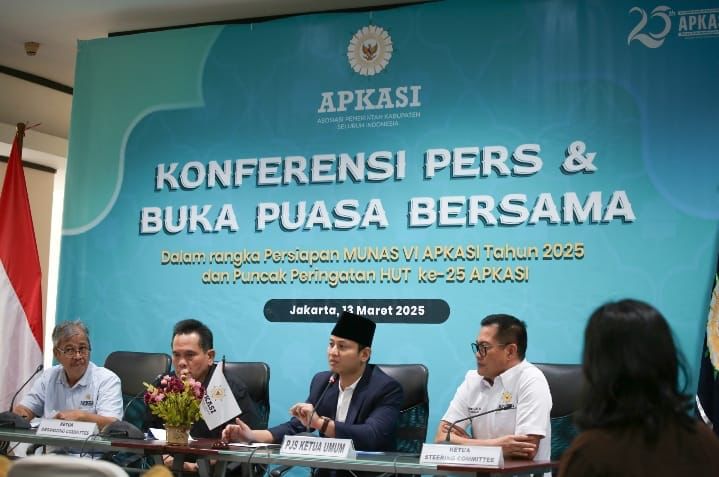Heaptalk, Jakarta – The Association of Indonesian Regency Governments (Apkasi) is preparing for the 6th National Congress (Munas VI) of Apkasi which will be held on May 30, 2025, in North Minahasa Regency, North Sulawesi Province. Known for the stunning beauty of Likupang, this regency was chosen as the host for the grand event, which will coincide with the 25th anniversary of Apkasi’s establishment.
In a press conference held at the Apkasi office in Jakarta on Thursday (03/13) Acting Chairman of Apkasi, Mochamad Nur Arifin, who is also the Regent of Trenggalek stated, “Munas VI Apkasi will not only serve as a platform for electing the definitive Chairman for the 2025-2030 term, but also as a forum to discuss key strategic issues related to regional development.”
Arifin, popularly known as Cak Ipin, explained that several crucial issues would be on the agenda, including the proposal for electing regional heads through the local parliament (DPRD), revisions to the Regional Government Law (Law No. 23/2014), and the management of Financial Transfers to Regions and Villages (TKDD). “We will also discuss alternative regional financing strategies, particularly after the efficiency measures on the General Allocation Fund (DAU) and Special Allocation Fund (DAK). This is vital for ensuring fiscal independence at the regional level,” he emphasized.
In addition, Apkasi is set to highlight the potential of carbon trading as an innovative solution to enhance regional fiscal capacity. “We have been exploring a collaboration with PT PLN Icon Plus to develop low-carbon projects that can be certified and traded. This presents a huge opportunity for regions,” Cak Ipin added enthusiastically.
Munas VI Apkasi is expected to be opened by President of the Republic of Indonesia, Prabowo Subianto. “We have sent an invitation to the State Secretariat to schedule the President’s attendance. His presence is crucial for providing direct guidance to the regents,” Cak Ipin stated. He emphasized that 85% of Indonesia’s landscape is in the regencies, meaning national development cannot be achieved without tangible contributions from the regional level.











